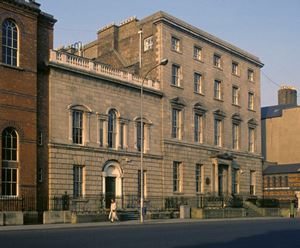 Massive congratulations to Roddy Doyle – his latest novel, The Guts, has been named Irish Novel of the Year at the Bord Gáis Irish Book Awards.
Massive congratulations to Roddy Doyle – his latest novel, The Guts, has been named Irish Novel of the Year at the Bord Gáis Irish Book Awards.
A lot of water has passed under a lot of bridges since Paddy Clarke Ha Ha Ha won the Booker Prize. Even that, Doyle’s masterpiece, published 20 years ago – 20 years ago! – came a few years after the completion of the Barrytown trilogy and the success of the movie version of The Commitments.
Doyle hasn’t exactly been inactive in the two decades since. Quite the opposite – the books The Woman Who Walked Into Doors and Paula Spencer and the ambitious Henry Smart trilogy (1999 to 2010), the TV series Family, the memoir Rory & Ita, a collection of short stories (Bullfighting), a series of acclaimed children’s books and the fantastic Fighting Words venture have all been worthwhile.
But by all accounts (aaarrrrgggghhhh – it’s on the to-read list), the publication this year of The Guts, a return to the world of the Barrytown gang more than two decades on, felt like getting home after a long journey. The diversion was all the more welcome after last year’s Two Pints, a tiny, needless book that felt both like a publishing swindle and a pale imitation of his previous work. Because Roddy Doyle did as much as anyone to define the Irish identity at the end of the dark days of the ’80s. It’s often been said that the Ireland soccer team of 1988 and 1990 helped to usher in the Celtic Tiger. That’s probably a gross simplification, but what is beyond dispute is that Doyle’s work captured the Ireland of the day better than anyone else.
Dialogue has always been integral to Doyle’s work – it’s no surprise that The Commitments, at less than 200 pages, much of it razor-sharp dialogue, was so successful as a screenplay. Here’s Dave Eggers, of McSweeney’s publishing house and acclaimed author in his own right, talking about Doyle after a New Yorker fiction podcast reading of the story “Bullfighting” a couple of years ago:
I don’t think there’s anybody alive that’s better at dialogue than Roddy Doyle, and I think that was one of the first things that attracted me to his work.
He doesn’t make a conversation into a long, ornate mess. He writes dialogue and it reads at the speed of actual conversation and it gives it a buoyancy and a levity that’s central to his work, even though the language itself in the dialogue is pretty everyday.
He doesn’t give them words they wouldn’t actually say in the pub. He doesn’t have them make incredible insights when they’re three, four beers in. I don’t know how often a bunch of guys drinking beer and watching a game say incredibly brilliant or insightful things, it’s pretty rare. So I think when you let them make a joke over what it would be like to have relations with your mother-in-law, it gives it a nice truthful rhythm.
You can listen to Dave Eggers reading “Bullfighting” at the New Yorker fiction podcast here. It’s an hour you won’t regret.



